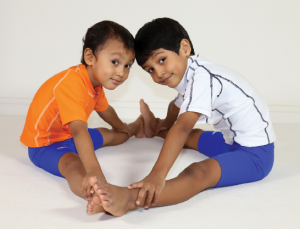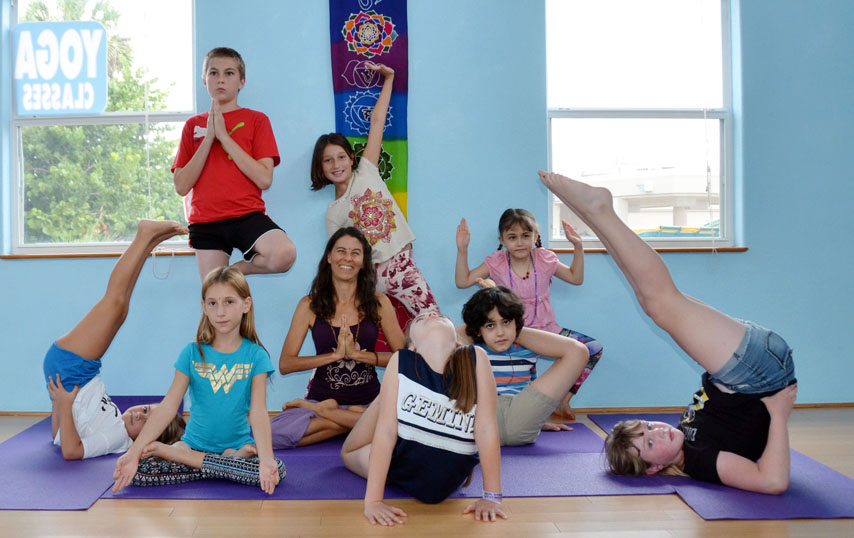For almost 20 years, I have had the pleasure and privilege of teaching Yoga to kids and during that time, they have taught just as much as I have endeavored to teach them. My desire to encourage young Yogis has led me to many school and after-school programs, community centers, at home private classes, summer camps, community partnerships, and regular Yoga studio time with children. I’ve downward dogged with pre-k kids, teens and every age in between. Working in the unpredictable, ever curious, challenging, humorous, fantastic, heart-warming world of children has helped me on my own journey to become a better Yoga student.
 My initial introduction and training into Yoga life began when I met my Guru, Swami Kailashananda. The many years I spent with him learning, absorbing and practicing Yoga launched me on a journey of Self-discovery and immense healing which is continuing to this day. I am so grateful for the holistic approach to life Yoga affords and I suppose it is this aspect of developing the whole person-physical, mental, emotional and spiritual that motivates my personal practice and how I work with kids. I try to view teaching as an extension of my practice. This allows me to shine some light on the inner dynamics and access my level of equanimity. Am I balancing good planning with spontaneity? Am I being rigid or adapting to the energy and needs of the children? Am I coming from a place of compassion or did I get swept away with irritation? Kids are great at testing adults. In fact, they are adept at it. Young Yogis always keep me on my toes even when I’m not in prapadasana!
My initial introduction and training into Yoga life began when I met my Guru, Swami Kailashananda. The many years I spent with him learning, absorbing and practicing Yoga launched me on a journey of Self-discovery and immense healing which is continuing to this day. I am so grateful for the holistic approach to life Yoga affords and I suppose it is this aspect of developing the whole person-physical, mental, emotional and spiritual that motivates my personal practice and how I work with kids. I try to view teaching as an extension of my practice. This allows me to shine some light on the inner dynamics and access my level of equanimity. Am I balancing good planning with spontaneity? Am I being rigid or adapting to the energy and needs of the children? Am I coming from a place of compassion or did I get swept away with irritation? Kids are great at testing adults. In fact, they are adept at it. Young Yogis always keep me on my toes even when I’m not in prapadasana!
Another unique challenge in kid classes is how to translate the complex ideas of Yoga into simple truths kids can understand. For instance, how does one describe OM, karma, meditation, the concepts of yama & niyama, or nirvana to a nine-year-old? Whenever I need direction I can always look to the example of great spiritual masters who remind us that clarity doesn’t have to be complicated. Contentment can simply mean being ok with who you are, what you have and where you’re at. A kid-sized definition of meditation can be described as focusing inside and finding your happy place. And regarding karma, everybody knows about a boomerang: what we give out, comes back to us. To encourage these inner qualities and positive thinking, I often use power thoughts in class. Simple statements for kids to reflect on such as: “I am centered: I have a still place in my heart where stress can’t go.” “I am patient: I am patient with others and with myself.” “I am kind to all: All beings need love I can help with a smile or kind word.” “I am wise: Whatever comes my way I am wise and can make good choices.” Helping children understand how the everyday choices we make effect our health and happiness, widens the scope of any class, workshop or program. Then Yoga becomes more than a sports enhancement, more than a creative movement class. It becomes a vehicle for creating self-respect, compassion and awareness and promotes habits for well-being which young students can continue to use throughout their lives.
The minds of kids, just like adults can get bored of the same old thing so for myself and my students I’ve had to mix things up and constantly infuse new inspiration while keeping with the core principles of the practice. Besides individual, group and partner poses, I also love to share mindful moments, mantras, chants & meditation, breathing, relaxation, power-thoughts, Yoga-themed games, stories, songs & crafts and use props and tools to keep the practice interesting and engaging. This creates an interdisciplinary approach to learning. Kids are great for giving honest feedback and letting me know what works and what doesn’t.
Recently, I decided to offer a kid’s enrichment program at the studio where I teach. While designing the coursework, I really saw how many lessons, tips and pointers I’ve received from kids, knowingly and unknowingly. I also realized how much they continually inspire me to inspire them. The classes, the students and the teacher are all evolving. As with any form of conscious evolution, I think we must be present yet honor the insights of those in the past. So many great Yogis and Yoginis have shaped the current practice of what we call Yoga today. Their expert instruction and advice is still very necessary and relevant. In the Taittiriya Upanishad we find: “Meditate; learn and teach…Educate your children; learn and teach.”
With their guilelessness and playfulness, hundreds of little warriors and crows and mountains have rolled out their colorful mats with me over the years and the benefits have certainly extended both ways.
Benefits For Kids
- Yoga builds self-esteem and respect.
- Concentration is a clear benefit of children’s yoga. It helps children to focus and concentrate in school and get better grades. That is because the asana practice encourages children to clear their minds and create a single-minded focus on the task at hand. (so, “om-work” helps with homework)
- Yoga brings balance and coordination.
- Yoga gives children constructive methods for managing their emotions and stress bringing self-control.
- Yoga in group settings encourages kindness and acceptance of all.
- By developing body awareness, children value and respect themselves deterring destructive behavior i.e. drugs, alcohol.
- Yoga brings out one’s inner creativity.
- Instruction in class develops good listening skills and power of observation.
- Asanas foster a personal connection with nature as many are named after animals, plants, flowers in the natural world.
- Deep breathing and relaxation allows kids to be their own healer, teaching them the importance of rejuvenation in the busy fast-paced world.
- Yoga teaches self-discipline and helps kids develop and reach goals through their effort.
- Yoga helps kids find their happy place-they can create an inner world of peace and calm which they can draw from whenever.
Benefits For Adults
- Don’t show up without it, in life or kid Yoga class!
- We remember the joy of life in play and kids are experts.
- Kid Yoga affirms the concepts of unity, acceptance, non-judgement which most kids naturally possess in abundance.
- The lightness of simplicity. We learn how to take complex concepts and make them clear, simple and practical.
- Kid Humor. Laughter lightens our load reminds us not to take ourselves so seriously.
- Being receptive. Kids have a great capacity for embracing to new things. They aren’t as afraid, attached or stuck in old habits.
- Keeping it real. Being honest with kids is the best way to develop trust and respect and lets us practice the phrase, “I don’t know”.
- Be an example. If we teach poses & peace, kids will watch and call us out, saying, “Can you do that?” “Are you always peaceful?” Watch out!
- Instructing kid classes forces us to balance “a plan” with spontaneity.
- Did I mention patience? Kids are great at teaching this.
- Discipline with kindness. Yoga practice shouldn’t feel like a boot camp, adult or kid. From kids, we can develop compassion for our own inner child.
- When we see each kid as our own, give them encouragement, a gentle corrective touch (and hug), love, trust and affection comes flooding back to us, ten-fold. Well, that’s how I go to my happy place.
Instilling the precepts of Yoga and meditation in children helps shape a future where adults honor themselves, other beings and the planet and that kind of world is one in which we all benefit! No matter who I learn from or teach, it’s been remarkable to see how mindful practice can adapt to any age and yet connect us in a way that’s ageless.
Om Tat Sat~
“If every 8 year old in the world is taught meditation, we will eliminate violence from the world within one generation” The Dalai Lama
Karuna has had the pleasure of teaching kids Yoga for over 20 years. She has taught in both public and private schools, studios and community centers. She has instructed private lessons, led family Yoga classes, designed, instructed and hosted kid Yoga public performances, taught teen Yoga, served regularly as a summer camp Yoga instructor and is the creator of “Conscious Kids”- a holistic approach to kid health and happiness using a wide range of healing modalities. Under the direct instruction and advice of her teacher, Yoga Master Swami Kailashananda, Karuna has taken her skills out to budding Yogis of every age in order to help kids develop better concentration; promote greater self-confidence and constructive habits for physical, mental and emotional well-being which they can continue to use throughout their lives.
To read the full article please download our Asana Journal App or purchase Issue 154 Oct 2015.




















 Other
Other